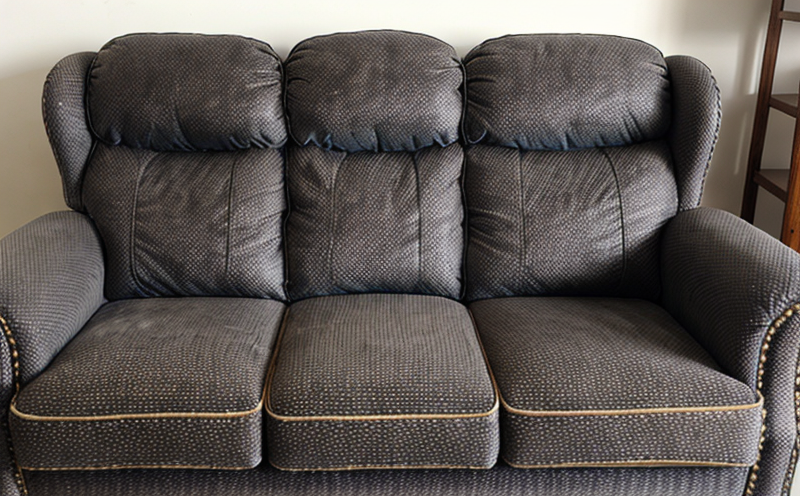Structural Integrity Testing of Beds and Bunk Beds
The structural integrity testing of beds and bunk beds is a critical process within the consumer products sector. This service ensures that the furniture meets safety standards, durability expectations, and performance requirements set by regulatory bodies such as ISO and ASTM International. Compliance with these standards is essential for maintaining consumer confidence and ensuring product safety in the marketplace.
The testing of beds and bunk beds involves a series of rigorous evaluations that assess various aspects of structural integrity, including but not limited to load-bearing capacity, stability under stress conditions, and resistance to deformation. These tests are particularly important given the high frequency of use and the potential for significant weight loads on these products.
For beds, this includes evaluating the bed frame, mattress support system, headboard, footboard, and side rails. For bunk beds, additional considerations include the ladder stability, height clearance between levels, and the overall structural integrity when two or more people are present in a single level.
The testing process typically begins with a review of design specifications to ensure they align with safety standards. From there, specimens are prepared according to the relevant protocols specified by industry guidelines. Instruments used may include load cells, strain gauges, and video analysis systems to monitor deformation during stress tests.
Once the test setup is complete, the furniture undergoes a series of loading cycles that simulate real-world conditions such as sleeping loads, moving within the bed, or children climbing on a bunk bed. The data collected from these tests is analyzed to determine if the product meets the required standards for stability and durability.
Testing procedures are designed to be comprehensive yet reproducible, ensuring consistent results across multiple samples and testing environments. This approach helps manufacturers identify potential weaknesses early in the production process, allowing for timely corrections before products reach consumers.
The importance of this service cannot be overstated, especially considering the variety of materials used in furniture construction today. From wood to metal frames, each component plays a crucial role in maintaining structural integrity over time. By conducting regular tests throughout the product lifecycle, companies can ensure their products remain safe and reliable for years to come.
Moreover, compliance with international standards like ISO 20783-1 (for mattresses) or ASTM F1956 (for bunk beds) not only enhances safety but also provides a competitive edge in the market. Consumers increasingly value brands that prioritize quality and safety, making compliance an essential marketing tool.
At Eurolab, we pride ourselves on providing top-tier services with state-of-the-art equipment and experienced personnel. Our commitment to excellence ensures that every test conducted is accurate, reliable, and up-to-date with the latest industry trends. Whether you're a small manufacturer looking for initial compliance or a large corporation seeking continuous improvement, our team is here to support your needs.
Why It Matters
The structural integrity of beds and bunk beds directly impacts user safety and comfort. A bed that collapses under normal use can lead to serious injury, while unstable bunk beds pose additional risks due to the presence of multiple users. Ensuring proper design and construction through thorough testing helps mitigate these hazards.
- Consumer Safety: Regular structural integrity tests help identify potential failures before they become critical issues.
- Brand Reputation: Consistent compliance with safety standards enhances consumer trust and loyalty.
- Legal Compliance: Meeting regulatory requirements reduces the risk of legal action and product recalls.
- Product Lifespan: Strong structural integrity translates to longer-lasting products, which is beneficial for both consumers and manufacturers.
In essence, structural integrity testing is not just about meeting legal requirements; it's also a crucial aspect of responsible manufacturing that contributes positively to society by promoting safer homes.
Eurolab Advantages
At Eurolab, we offer unparalleled expertise and cutting-edge technology tailored specifically for structural integrity testing of beds and bunk beds. Our team comprises highly skilled professionals who are well-versed in the latest industry practices and standards.
- Accurate Testing: Utilizing advanced instrumentation ensures precise measurements and reliable results.
- Comprehensive Reporting: Detailed reports provide actionable insights for continuous improvement.
- Regulatory Expertise: Our analysts stay updated on all relevant regulations, ensuring full compliance.
- Confidentiality: We respect your business and maintain strict confidentiality regarding proprietary information.
We pride ourselves on delivering exceptional service that exceeds expectations. With Eurolab by your side, you can be confident in the quality and safety of your products.





